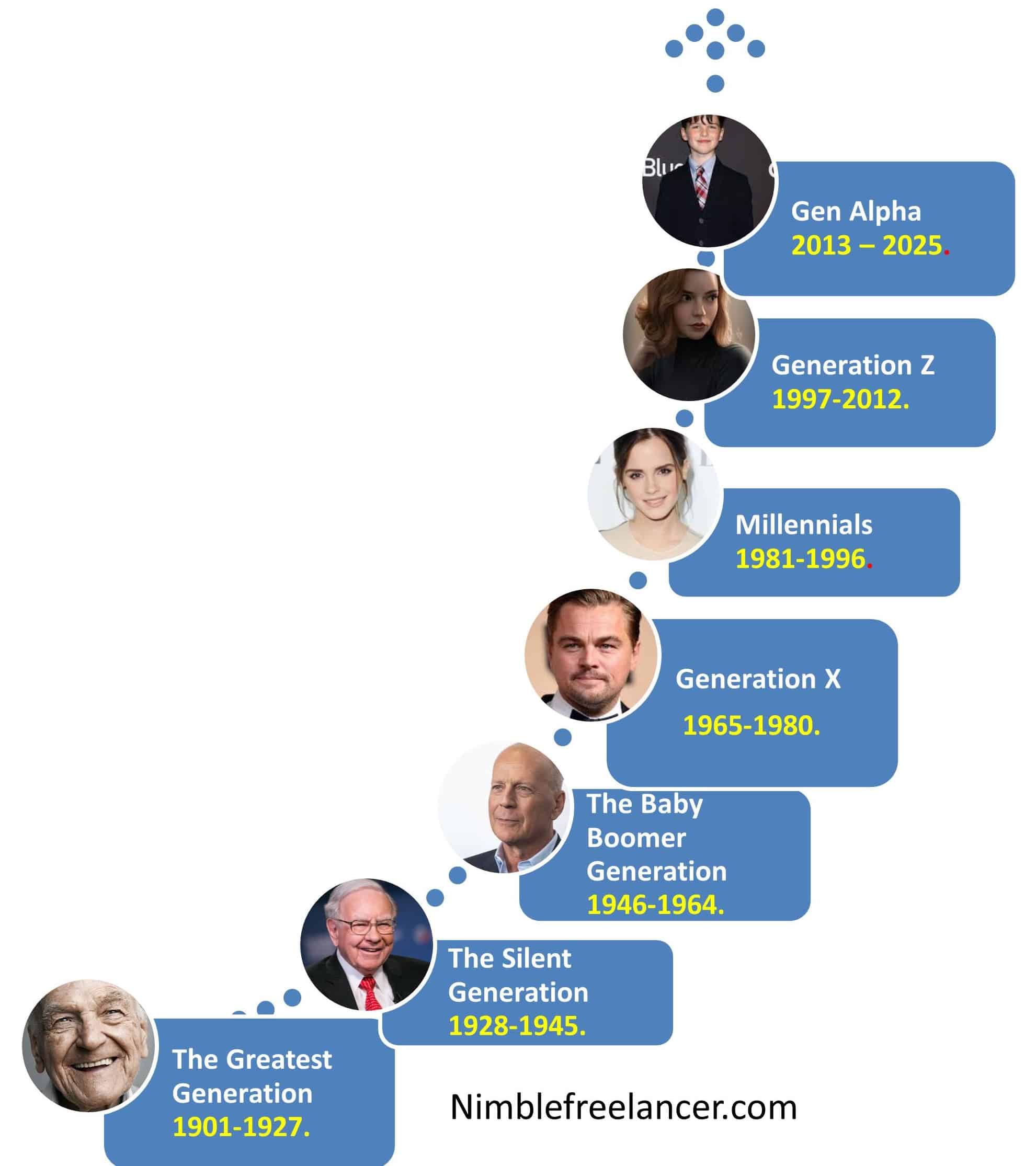The Gen Alpha Generation, also known as Generation Alpha, comprises individuals born between 2013 and 2025. This makes this generation the first to have been born entirely within the era of technological advances and unprecedented digital connectivity. As such, members of this generation are often referred to as “digital natives” due to their remarkable ease in adapting and utilizing technologies that may appear intimidating or complex to those born prior.
What Years are Gen Alpha Generation?
The Gen Alpha Generation represents generations born between 2013 and 2025. However, we should take the year range roughly because the Gen Alpha Generation is usually delivered between the early 2010s and mid-2020s.
Based on the most common classification, generation names are:
- The Greatest Generation – born 1901-1927.
- The Silent Generation – born 1928-1945.
- The Baby Boomer Generation – born 1946-1964.
- Generation X – born 1965-1980.
- Millennials – born 1981-1996.
- Generation Z – born 1997-2012.
- Gen Alpha – born 2013 – 2025.

Even though Gen Alpha is a comparatively young generation, it is already making waves across many areas of society. One area in which it is particularly influential is on social media platforms such as Instagram and YouTube, where it is often seen as trendsetters and influencers. It is also heavily active on messaging apps like Snapchat and WhatsApp. This presence on social media has led marketers to target this generation specifically with tailored advertisements designed to appeal to their interests.
The main characteristics of the Gen Alpha are:
- This is the most technologically advanced generation yet, with the majority having access to the Internet and smart devices from a very young age.
- Their curious, creative, and open-minded nature reflects their preference for exploring new ideas and concepts.
- An intuitive and experimental approach to learning, relying on experimentation rather than traditional methods of instruction.
- Openness to embracing new technologies, such as virtual reality and artificial intelligence, at a much earlier age than previous generations.
- High level of education attainment due to parents providing high-quality education opportunities through tutoring or alternative forms of learning such as online classes or homeschooling programs.
- Compared to other generations, there is a greater emphasis on developing soft skills (such as communication, problem-solving, creativity, and empathy) due to the increased availability of online resources and mentorships with adults outside their family environments.
- Increased use of technology for leisure activities, such as gaming and social networking sites, can make children more socially isolated than previous generations if they are not adequately monitored by adults.
- Increased diversity within the population due to an overall increase in immigration over the past few years resulted in higher levels of cultural understanding between different ethnic backgrounds within this generation’s population.
- Higher focus on environmental issues when compared to other generations due to increased awareness through activity on social media platforms regarding climate change and other ecological concerns around the world; this is particularly noticeable among younger members of Gen Alpha who are actively engaging in initiatives aimed at lowering carbon emissions or promoting sustainable practices like recycling and composting.
- There has been an increased focus on mental health awareness within the population resulting from increased access to mental health resources such as therapy apps or support groups online. Many Gen Alpha individuals also prioritize taking care of their mental health by engaging in recreational activities such as mindfulness meditations or yoga sessions as part of their daily lives.
It is estimated that there will be around 2 billion members of Gen Alpha by 2025—making it one of the largest generations yet! This generation is incredibly diverse, too; Gen Alphas come from various backgrounds, cultures, nationalities, races, genders, religions, and more. They tend to have progressive views on gender roles and racial inequality, which sets them apart from previous generations who may have had more traditional outlooks on these topics.
Regarding education, Gen Alphas have access to some of the most advanced educational tools ever created. These include interactive e-learning platforms, online tutoring programs, and personalized educational content tailored to each student’s needs and learning abilities. These tools give students access to higher-quality education and allow them to learn at their own pace—a feature unheard of before Gen Alpha’s emergence!
This technologically savvy generation has no shortage of career opportunities, either. Many large companies now actively seek out candidates from Gen Alpha due to their tech-savvy capabilities and innovative problem-solving ideas. In addition, many progressive organizations currently employ Gen Alphas due to their progressive attitudes toward traditional gender roles; these organizations recognize that they can bring unique perspectives that can lead them to success in various sectors.
From how they interact with technology to their awareness regarding social issues—it’s clear that members of Generation Alpha are unlike any other generation before them! While there is still much we don’t know about them yet—one thing is for sure: this technically savvy group will continue pushing forward with new ideas that will shape our future for years beyond 2025!
- Facebook Ads to Get Followers! - December 27, 2024
- ClickUp vs. Slack - December 20, 2024
- Mastering E-Commerce Analytics: A Blueprint for Success





